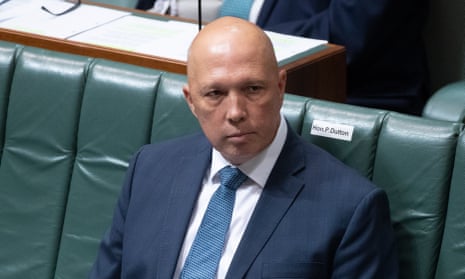Labor has shot down a proposal from Peter Dutton that could have resulted in taxpayers footing the bill for MPs’ defamation cases because it could be considered a “workplace entitlement”.
On Friday the manager of opposition business, Tony Burke, rejected the idea that Dutton, as the leader of the house, raised during debate about whether to investigate Liberal MP Christian Porter over his declaration that a trust with confidential donors paid part of his legal fees.
Burke’s intervention is likely to kill the proposal, as Dutton had suggested such a move would require bipartisan support.
In recent years Australia has seen an explosion of high-profile defamation cases involving politicians, including Dutton’s case against refugee activist Shane Bazzi and senator Sarah Hanson-Young’s successful case against former senator David Leyonhjelm, for which she used crowdsourced funds.
Dutton told the House of Representatives on Wednesday that while “many people come into this parliament, on both sides, with significant wealth … there are many members … who don’t have those deep pockets to defend a defamation trial, in some cases costing over a million dollars. That’s the reality.”
Dutton wrote to the privileges committee asking it to consider clarifying the rules on how donations to pay for legal cases should be declared.
He said there were “other steps that … should be contemplated between the government and opposition”, foreshadowing that he wanted a “sensible discussion” with the opposition about an “appropriate next step” for parliament to take.
“I think it’s a workplace entitlement issue and I think it’s a broader discussion that should be had,” Dutton said, raising the prospect of taxpayer funding of cases.
On Friday Burke told reporters in Canberra public funding for MPs’ litigation “is certainly not an entitlement”.
“It’s certainly not. And it’s not something that’s our policy or that we’re in support of.”
Under the current rules, ministers are eligible to have their legal fees for cases relating to their duties, including defending defamation cases, paid for by taxpayers.
In May, Hanson-Young protested at a Senate estimates hearing that the assistant minister for forestry and fisheries, Jonathon Duniam, had been granted public funding for legal costs he incurred for false comments claiming her niece was put in harm’s way at an anti-logging rally. Duniam apologised for the comments.
Burke also signalled Labor will continue to pursue Porter over the donation disclosure issue, noting the privileges committee could still make findings about him but calling on the government to remove doubt by referring the MP’s disclosure to it next week when parliament resumes.
In September, Porter declared that the Legal Services Trust had paid part of his legal fees arising from the private defamation case he instigated against the ABC. The former attorney general said as a “potential beneficiary” of the blind trust he had no access to information about the source of the funds.
On Wednesday the Coalition used its majority in the House of Representatives to vote down a Labor push to refer Porter to the privileges committee to determine whether his declaration complied with relevant disclosure rules, despite the speaker, Tony Smith, finding there was a “prima facie case” to investigate.
Porter denies breaking the rules and Smith noted his conclusion there was a “prima facie case” against him “does not imply a conclusion that a breach of privilege or contempt has occurred”.
The prime minister, Scott Morrison, has said Porter’s declaration will now be examined by a broader review of the rules.
Sign up to receive an email with the top stories from Guardian Australia every morning
On Friday Burke noted Dutton’s request to the committee contained no reference to Porter. He said the committee may do more than refine the rules but “if you want to make sure of that you have a vote of the parliament”.
Burke said Labor had “no objection” to a broader review but the rules are “not unclear” because a disclosure needed to reveal the source of funds.
On the day he resigned as a minister in September, Porter said in a statement he was “not willing to put pressure on the trust to provide me with any further information … to which I am not entitled”.
